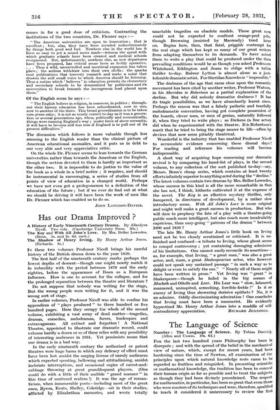Has our Drama Improved ?
A History of Early Nineteenth Century Drama. By Allardyee
(Bonn. 5s. and 3s. (Id. each.)
The Shadow of Henry Irving. By Henry Arthur Jones. (Richards. 6s.) IN these two volumes Professor Nicoll brings his careful history of the British drama down to the year 1850.
The first half of the nineteenth century marks perhaps the lowest depths of descent—though one might nearly match it in imbecility with the period between 1870 and the -early eighties, before the appearance of Ibsen as a European influence. How is one to account for the collapse, and for the prolonged separation between the theatre and literature ?
Do not suppose that nobody was writing for the stage. But the wrong people were writing for it, and it was the wrong sort of stage.
In earlier volumes, Professor Nicoll was able to confine his appendices of "plays produced" to three hundred or five hundred pages. Here they occupy the whole of the second volume, exhibiting a vast array of dead matter—tragedies, dramas, comedies, melodramas, farces, burlesques and extravaganzas. All extinct and forgotten ! A National Theatre, appointed to illustrate our dramatic record, could exhume hardly a dozen or so of these relics with any possibility of interesting audiences in 1931. Yet pessimists moan that our drama is in a bad way.
In the early nineteenth century the authorised or patent theatres were huge barns in which any delicacy of effect must have been lost amidst the surging license of unruly audiences which expected spouting, bellowing and attitudinising, amidst inebriate interruptions, and occasional orgies of carrot-and- cabbage throwing at great grandiloquent players. (One could do with a little of their audible "grand manner" in this time of muttered realism !) It was the age of roman- ticism, when innumerable poets—including most of the great ones, Byron, Keats, Shelley, Coleridge—sat in their studies, afflicted by Elizabethan memories, and wrote totally
unactable tragedies on obsolete models. These great men could not be expected to confront orange-Peel pits, though Browning (assisted by Macready) tried later on. Begins here, then, that fatal, priggish contempt for the real stage which has kept so many of our great writers from adapting themselves to its demands. To have asked them to write a play that could be produced under the then prevailing conditions would be as though you asked Professors Whitehead, Eddington and Jeans to oblige with a talkie thriller to-day. Bulwer Lytton is almost alone as a just- tolerabl e dramatic artist. For Sheridan Knowles is" impossible."
The drabness of the age that came close upon the romantic movement has been cited by another writer, Professor Watson, in his Sheridan to Robertson as a partial explanation of the decline. But why did nobody dramatise drabness ? It has its tragic possibilities, as we have abundantly learnt since. Perhaps the reason was that a falsely pathetic and tearfully melodramatic convention, having got complete possession of the boards, clever men, or men of genius, naturally followed it, when they tried to write plays ; as Dickens (a fine actor) did when he experimented with the theatre. It Robertson's merit that he tried to bring the stage nearer to life—often by devices that now seem pitiably theatrical.
Wonderful is the industry that has enabled Professor Nicoll to accumulate evidence concerning these dismal days ! For reading and reference his volumes will become indispensable.
A short way of acquiring hope concerning our dramatic revival is by comparing his hand-list of plays, in the second volume, to any collection of the sort published to-day—say, Messrs. Benn's cheap series, which contains at least twenty efforts infinitely superior to anything acted during the "decline." The latest volumes contain two dramas by Mrs. Belloc Lowndes, whose success in this kind is all the more remarkable in that she has not, I think, hitherto cultivated it at the expense of the novel. The Key is an effective mystery thriller, only hampered, in directness of development, by a rather slow introductory scene. With All John's Lore is more original and might well make a great success in production. But who will dare to prophesy the fate of a play with a theatre-going public much more intelligent, but also much more incalculably capricious, than easy-going "patrons of the drama" between 1800 and 1850?
The late Mr. Henry Arthur Jones's little book on Irving need not be too closely scrutinised or criticised. It is un- finished and confused—a tribute to Irving, whose ghost seems to compel controversy ; yet containing damaging admission of his limitations. One cannot easily reconcile its assertions— as, for example, that Irving, "a great man," was also a great actor, and, more, a great Shakespearian actor, who however could not speak any sustained passage "in such a way as to delight or even to satisfy the ear." "Nearly all of them might have been written in prose." Yet Irving was " great " in Shakespeare—though he failed in the big scenes of Macbeth and Othello and Lear. His Lear was "slow, laboured, mannered, uninspired, screeching, forcible-feeble !" Is it an enemy of Irving thus showering derisive epithets ? No, it is an admirer. Oddly discriminating admiration ! One concludes that Irving must have been a mesmerist. He evidently hypnotised Mr. Henry Arthur Jones into a muddle of self-











































 Previous page
Previous page